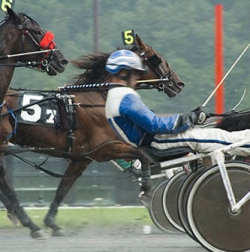The Michigan House of Representatives votes today on a bill which would legalize horse race betting on smartphones and the Internet. Under the current law, a person who wants to engage in horse betting in Michigan must be physically present at the races.
House Bill No. 4611 was introduced by State Rep. Dan Lauwers on May 11, 2017.
If passed, HB4611 would allow for affiliates for horse racing on smartphones and other Wi-Fi compatible devices. HB4611 amends certain aspects of a gaming law which has existed since 1995, long before mobile smartphones existed — much less supported gambling.
Allows Third Party Operators
Under the new bill, third party operators would be able to apply and regceive a license to facilitate wagering on horse races. The gambling would be legal on desktop computers, laptop notebooks, tablet computers, and smartphones.
The bill allows “third party facilitator licenses for persons contraced by race meeting licensees to facilitate wagering on live and simulcast racing. The racing commissioner shall set the terms and conditions and the appropriate fee for the license.”
Michigan Gaming Commission’s Authority
Thus, the Michigan Gaming Commission receives a signficant amount of added authority under House Bill 4611. The licensing fees, fines, and policies have not been determined, but would be set by the Gaming Commission at a date later in the year.
The new law sets down the forms of pari-mutuel wagering which would be illegal under Michigan law. That includes non-licensed facilitators, who would receive punitive fines and imprisonment. Also, third party affiliates would hold a license for desktop and mobile gaming for only one single horse racing facility.
Online Gamling in the USA
No estimate was given for the amount of tax revenue Michigan smartphone betting would generate. Though online gambling is banned in most parts of the United States, it is estimated that Americans bet $2 billion online each year. That activity includes regulated gambling on online casinos and poker sites in New Jersey and Delaware, along with regulated online poker in Nevada. It also includes unregulated offshore online casinos, card rooms, and sportsbooks.
Sports betting is illegal throughout the United States, under the auspices of 1961 Wire Act. Consequently, online sports betting is banned through the 2006 Unlawful Internet Gambling Enforcement Act. Only unregulated sites allow Americans to bet on sports for real money. The UIGEA states that any form of gambling that is illegal under the Wire Act is illegal under the UIGEA, if done online or on mobile platforms. Enforcement is done through either sanctioning online payment processors, or seizure of domains with an indictment.
Michigan Daily Fantasy Sports
Because the UIGEA had a carve-out for fantasy sports, a number of daily fantasy sports sites have gained in popularity over the past few years. That includes DraftKings and FanDuel, which command 95% of the United States DFS market between them. Daily fantasy sports gaming has led some people to push for an end to the ban on sports betting, but repeal of the federal ban does not appear to be imminent.
Does Not Approve Smartphone Sports Betting
That means Michigan’s state legislature can pass a mobile and online horse betting law, but cannot legalize sports betting in the same way. In places like the United Kingdom and Australia, live sports betting on the smartphone has become a gambling phenomenon — and sometimes a controversial phenomenon. That live betting, sometimes known as “in-play betting”, allows many wagers to placed on a sporting event.
Because horse racing happens so quickly, it is not a natural fit for in-play betting, though 70% of live betting in the UK is done on the horse races. 70% of live betting in Australia is done on sporting events like soccer, Australian rules football, and cricket. Because those games allow many in-play bets on the smartphone for one single contest, in-play betting is much more controversial in Australia.
Michigan Senate
If HB 4611 passes in the House of Representatives, the Michigan Senate would have to pass the same bill. If that happened, then HB 4611 would go to the desk of Michigan Governor Rick Snyder.
Passage in the Senate is by no means a cinch. As in Pennsylvania, New York, and Florida, gaming bills which pass easily in one house of the state legislature failed by a significant margin in the other house.

